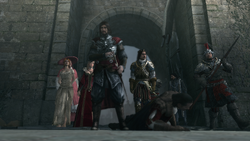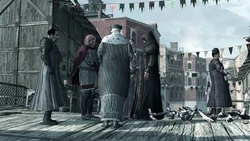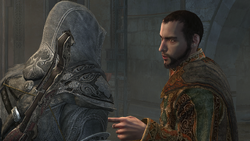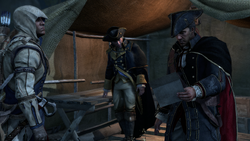- "We both strive for the same end, Ezio. Only our methods differ. Do you not see that? Peace. Stability. A world where men live without fear."
- ―Prince Ahmet, leader of the Byzantine Templars from 1509 to 1512.[src]

Cesare Borgia about to execute Mario Auditore at the Siege of Monteriggioni.
It has been a few years since we fought the evil reign of the Borgia and the Italian Templars as the benevolent Ezio Auditore da Firenze, with the aid of his Brotherhood of Assassins. After we had traveled through Italy battling Rodrigo Borgia's corrupt conspiracies, we settled in Rome to face his son Cesare's murderous tendencies and ambitions of conquest. We witnessed several decades of the Assassins trying to free the people of the Italian city-states from the dark rule of the Templars.
The Italian Templars of the late 15th and early 16th century had imbued the minds of the majority of the fans that the belief that all Templars are evil. While Assassin's Creed made the player think about whether their actions were the right ones to make, and Assassin's Creed: Revelations tried its best to erase the "Templars only want power" mentality, and Assassin's Creed III made us see the Templars' goals briefly through giving us control of Haytham Kenway, the series still seems to be overshadowed by the 'black and white' view of the universe that Assassin's Creed II and Assassin's Creed: Brotherhood provided us with.
Freedom and control[]
- Connor: "Freedom IS peace."
- Haytham: "Oh, no. It's an invitation to chaos. Only look at this little revolution your friends have started. I have stood before the Continental Congress and listened to them stamp and shout. All in the name of liberty. But it is just noise."
- —Connor and Haytham Kenway discussing freedom.[src]

The Italian Templars planning the murder of Doge Mocenigo.
I personally believe that the "Dark Age of the Order", as the Templars refer to the time under the leadership of the Borgia, is the main blame for this. But of course, the concept of "peace through control" is understandably not put in a very positive light either, by both the Assassins and Erudito. When you put "control" against "freedom", it is understandable that people would go for the latter. But I don't think it is ever clearly defined that the Assassins want peace through freedom and the Templars want freedom through control. It is never explicitly explained what they would do and what would happen if the Assassins achieve freedom for all, or the Templars acquire control - so how can we really favor any over the other? In the end, both of them want peace, and the concepts of "freedom" and "control" have
The Assassins understand that the people do not want to be under the control of the Templars: freedom is what every human being wants. Freedom to do what they want to do. In some aspects, I suppose you could see the Assassins as being anarchists ("No. The strings should be severed. All should be free."); but through most of their history, they do seem to be in support of one government or another in most cases. Democracy is likely the Assassins' favored form of government, as it gives the people freedom to choose who to lead their country. However - as the Templars do continuously emphasize - people are flawed.

Prince Ahmet discussing the people with Ezio Auditore.
People make mistakes and bad decisions. With freedom, it is likely the people may cause chaos or start a war. As a straight-forward example, with a democratic government, it is possible a weak-willed or incapable President may be elected. Leaving the fate of the people in the hands of the Templars, who are men of knowledge and science (sans the Borgia etc), will likely prevent these mistakes from being made. After all, the Templars don't mean to make the people into personal slaves, but to achieve Utopia under their guidance. But when the people are controlled, it is only imminent that they will eventually revolt, as history has shown time and time again.
To me, it seems to be like an endless cycle, and that both Assassins and Templars are fighting for flawed ideologies. But of course, playing these games puts us right in the middle of the conflict, and it is only logical to take sides - but isn't it a little too easy to just blindlessly take the side the protagonist is a part of?
Benevolence and ruthlessness[]
- Assassin 1: "Are Brother Orelov's methods always so... savage?"
- Assassin 2: "He was a gentler man when I met him, years ago. Before they lost the child."
- —Two Assassins discussing the ruthlessness of Nikolai Orelov.[src]

Nikolai Orelov brutally interrogating a Templar.
I suppose when picking either side, the individuals who play a part in the conflict have an influence on what side we feel more inclined towards supporting. Both Altaïr Ibn-La'Ahad and Ezio Auditore da Firenze have been well-received by the fans, both for different reasons. Even though Altaïr was an arrogant man when we first met him, both individuals are men of honour and duty, and that creates a connection with the player. We are more inclined to support the Assassins than the Templars, who then automatically become "the bad guys". When we were introduced to Haytham Kenway, that all started to change a bit. Haytham was also well-received by the fans due to his persona, but I couldn't help but get annoyed by how many times I read "even though he is a Templar" on the internet. I suppose it is understandable, but I still find it frustrating.
It is important to keep in mind that throughout history, there have been ruthless Assassins and benevolent Templars just as there had been benevolent Assassins and ruthless Templars. Possibly the most prominent example would be Nikolai Orelov, the Russian Assassin born into the Brotherhood who started out loyal to the cause, but after the loss of his child grew bitter and ruthless. This reflected his methods and actions, leading up to the point where he started to resent the Order and left. After living in exile in the United States, the Mentor sent the Assassins to capture Nikolai and retrieve the shard of the destroyed Staff of Eden and to uncover the knowledge of Nikolai's vision during the Tunguska event. These Assassins were definitely not honorable men, threatening Nikolai's young son Innokenti and harshly treating the elderly Nikolai. It is also important to note that the Russian Assassins opposed the Imperial House during the Russian Revolution, thus aiding the Bolsheviks in establishing a 'populist government' - and I think communism is not a very welcome political ideology in this age.
Going back a little earlier into the lore, and we stumble onto François Mackandal, the leader of the Assassins on the island of Saint-Domingue (present day Haiti). Mackandal was a former African slave who became a voodoo priest and resented the white colonists, making public attacks on them. He was eventually executed after a failed poisoning on the colonists. His student Agaté fled to the French colony of Louisiana and became the Mentor of the Assassin Brotherhood there, recruiting Aveline de Grandpré and Gérald Blanc. Given his experiences of abuse, violence and his paranoia, Agaté struggled with life and eventually grew distant and harsh towards Aveline, cursing her for retrieving parts of the Prophecy Disk. His paranoia ultimately led him to attack Aveline, and after Aveline decided to spare his life, Agaté ended his life through suicide.

Haytham Kenway explaining George Washington's faults to Connor.
Throughout history, the Templars had been responsible for fueling numerous political ideas and making several scientific discoveries. We have the Templars to 'thank' for capitalism, which most of western society seems to support - but of course it is just a part of their plans. When speaking of an honorable Templar, it is not odd that Haytham Kenway is the first to come to mind. He had no trouble declaring his dissatisfaction for the killing of innocents, and was much more tactful and much less ruthless than most of his brethren - to the annoyance of Charles Lee. Despite realizing that Charles Lee may have been aiming to take Haytham's place, Haytham told him to leave when Connor came after Charles, holding his own son off so Charles could escape. It was also Haytham who realized that the men his Assassin son Connor supported would only aid themselves, and in the end they sold the land on which Connor's village stood, paying no respect to Connor's part in the American Revolutionary War.
Conclusion[]
- Desmond: "Have... Have we ever tried to make peace with the Templars?"
- William: "Throughout our history, there have been moments... Several, in fact. But... It's impossible. There are... existential differences. Insurmountable. If there were to be unity, it wouldn't be a truce so much as a submission."
- —Desmond and William Miles, discussing a truce between the Assassins and Templars.[src]
In the end, it would seem to me that the Assassins and Templars will keep playing king-of-the-hill, fighting for flawed ideals, considering their different ideas for peace each to be the right one and too different. And if the player were too really choose between either of them, if they even do want to do so, I'd say they have to think long and hard over who is really 'right' rather than limit themselves to the division between good and bad.
But ultimately, as Erudito stated in the hacked files in the Abstergo's privatized Animus, "They are more alike than they think." Both factions fight for undefined goals, plotting and murdering those who stand in their way, and attempting to force their ideals onto the people. Is one really more 'right' than the other?

